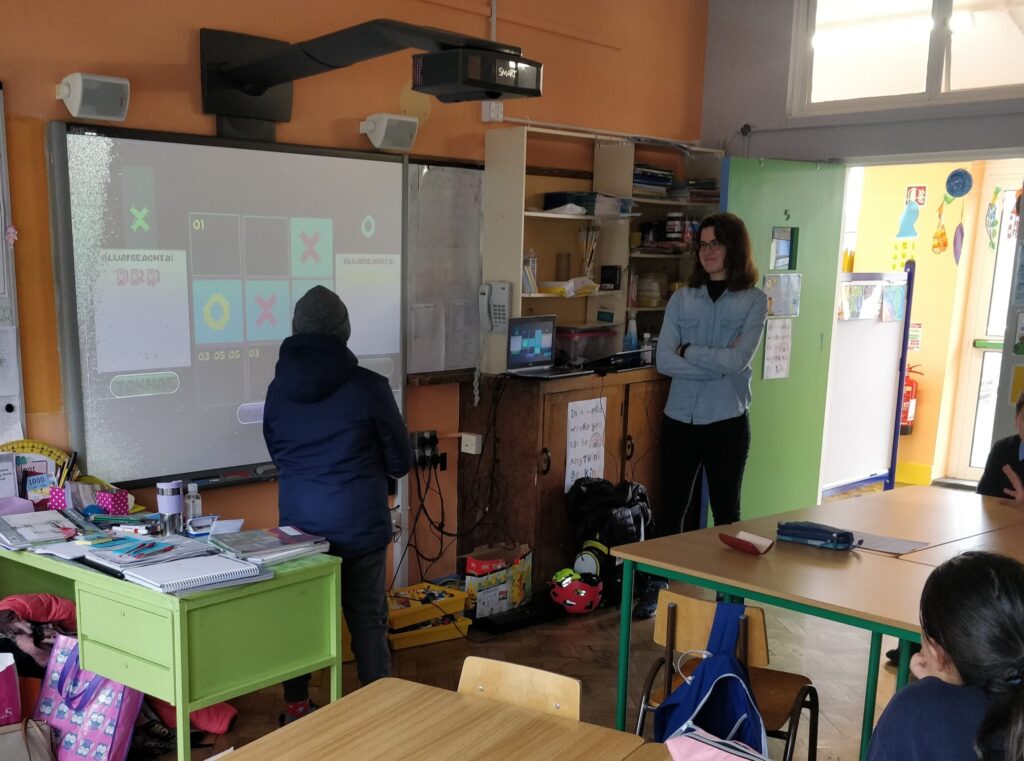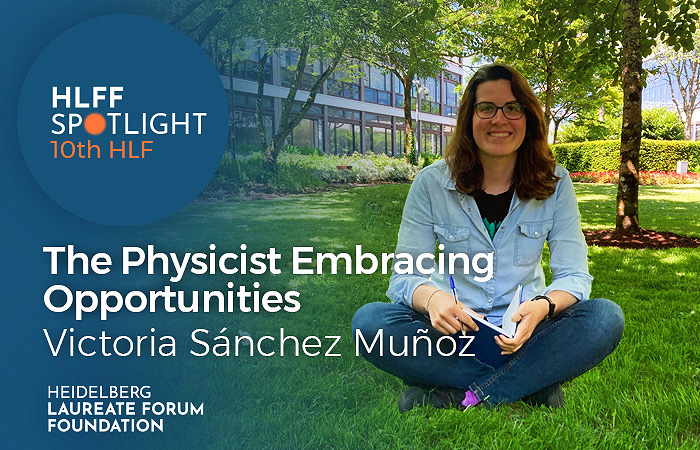HLFF Spotlight: 10th HLF
Engela Duvenage
The Physicist Embracing Opportunities – Victoria Sánchez Muñoz
The Heidelberg Laureate Forum has a single purpose: To provide some of the brightest minds in mathematics and computer science with the space and time to make connections and find inspiration. The HLFF Spotlight series shines a light on some of the brilliant young researchers attending the event, their background and research, as well as their expectations for the HLF.
Interested in community outreach projects? Then make sure to brainstorm a few ideas at the 10th HLF with upcoming attendee Victoria Sánchez Muñoz over a round of tic-tac-toe. Community engagement is one of the (many) aspects about her PhD studies on quantum games at the University of Galway (UoGalway) in Ireland that the 29-year-old Spanish physicist enjoys the most.
She uses an adapted version of the traditional pen-and-paper game of tic-tac-toe (also known as noughts and crosses, or Xs and Os) to workshop the basics of quantum physics with Grade 4 to 6 learners. They are given a quick tour of devices that were developed with input from the quantum physics field, such as LED lights and the lasers in supermarket scanners. A brief history lesson on computers and the quest to develop faster, more secure, and ultimately more superior quantum computers forms part of the workshop programme.
Victoria enjoys watching how willingly learners tackle unfamiliar problems and seeing how the experience of free play – within the realm of quantum physics – ignites the inner scientist in children. She hopes that some of them will one day consider a career in the sciences.
“It’s fantastic to see how children start playing without really knowing the rules. Their faces light up when they begin to work out how the game works when quantum principles are involved,” reflects Victoria, in whose vocabulary the word “fun” regularly crops up. “I’ve done the workshop with adults too, seldom with that same reaction. Adults are just super boring!”
Her workshop’s roots are to be found in a team challenge that Victoria participated in during an online quantum game jam in September 2021. She helped to develop a new educational quantum computer game called Heisenberg’s Bicycle.
After the event, she remembered a paper that proposed that it would be possible to play tic-tac-toe using quantum rules. She subsequently challenged herself to tackle it as her “Christmas 2021 Project”, while on vacation at home in the village of El Pinós in Alicante, Spain. By then Victoria had already investigated her fair share of simple quantum games as part of her PhD thesis that combines quantum physics and game theory under supervision of Dr. Michael Mc Gettrick of the School of Mathematical and Statistical Sciences at UoGalway.
She readily admits that working on a quantum-based version of tic-tac-toe while holidaying was more time-consuming than she had anticipated. Using what available spare time she had after the December break, she only “cracked the code”, so to speak, four months later.
When the opportunity to develop school-based workshops came along, however, it proved to have been time well spent. As member and president for two years of the UoGalway Student Chapter of the Society for Industrial and Applied Mathematics (SIAM) she has since presented it at nine primary schools in Galway.

Seizing opportunities
Victoria’s first ventures into outreach work started in 2013, when she and five university friends founded the Spanish educational YouTube channel “Tippe Top Physics” (now known as “Gastrofisica“).
“It was fun to do, and people liked it,” she remembers. “I realised that outreach was fun.”
During the COVID-19 pandemic, she again reached for this medium, when as part of her School’s Outreach Committee she helped produce an explanatory video about Möbius strips for the 2020 Galway Science and Technology Festival. Afterwards, she participated in the online version of FameLab Ireland.
“Perhaps my interest in science communication comes from the fact that I’ve always had to explain my work,” suggests Victoria.
Victoria, who is a teaching assistant to undergraduates in mathematics and statistics at UoGalway, also tutors modules in linear algebra and engineering mechanics. Previously, she had also tutored a student who lives with disabilities and helped older students with their courses as part of the University’s Access Centre.
She admits that she generally says yes when asked whether she’d like to participate in an event or be involved in a project.
“I know I should say ‘no’ more often, because I’m in the last stages of my PhD, but …”
Her handful of years in Galway, a city of 80 000 people in West Ireland with a strong student contingent, have taught her the value of opening the proverbial door when opportunity knocks.
“Anyone can get a PhD, but not everyone is for instance able to do outreach, go to schools and interact with children. I am grateful that I am allowed to do so.”
She makes a point of pursuing personal development goals and has for instance recently followed basic courses or workshops on CPR skills, the handling of sexual violence, and ways to turn research results into podcasts. She is also learning German and hopes to practise it more during the 10th HLF.
“Take advantage of opportunities for free learning that your university might offer. Once you are in the workplace, you’ll have to pay for such courses,” she motivates others to venture beyond the borders of their academic programmes. “And in any case, you cannot use your brain all the time just for your studies!”
A love for physics
Victoria comes from a family of teachers and nurses and enjoys tennis, reading, visiting the gym, and the outdoors.
She describes the story behind how she decided on a career in physics as “very cheesy, but all true.”
A career in the sciences was always a natural choice, because of her knack for maths and biology. By her last year in high school, when the subject matter became more interesting and challenging, physics began to enthrall her.
“One evening I was so busy solving a question about gravitational laws and its influence on a planet and its satellites that I completely forgot to have supper. I realised that if something could be so interesting that I’d skip a meal for it, it was worth pursuing as a career!”
She subsequently completed a Bachelor’s degree in Physics at the University of Valencia in 2016, followed by a Master’s degree in Theoretical Physics about entanglement and geometry at the Autonomous University of Madrid in 2017.
In 2018, Victoria was appointed as a junior programmer for a consultancy firm in Barcelona. She was soon underwhelmed by the experience of working in the private sector.
“I loved my colleagues and the city, but it just felt as if I was making rich people even richer,” she explains her subsequent decision to further her PhD studies. Now in its final stages, she hopes to submit her thesis by the end of 2023.
Taking on an insurance company
She loves the small “eureka” moments that are part and parcel of academic life and doing research. However, she admits that her greatest highlight yet – and also her biggest disappointment – has nothing to do with her PhD work.
It saw Victoria test her mettle against an insurance company unwilling to pay out when wind severely damaged her outdoor venetian blinds and her mother’s car was scratched in the process. The insurance company held fast: They only covered damages caused at wind speeds of 75 km/h or more, but it had only blown 73km/h on the night of the incident, the company claimed.
Their verdict was like the proverbial red muleta of a Spanish bullfighter, and Victoria went into “full research mode” to try and prove the company wrong. She downloaded weather and wind data from official sources. She then went to great lengths to use physics and geometry principles to prove that the wind had indeed blown stronger.
Emails went back and forth. Months later, a lawyer eventually informed her that her report could not be fully considered because she was not a qualified expert.
“The system wore me down, so I decided to finally let it go,” sighs Victoria, still not convinced that the decision was fair nor based on sound scientific principles.
As a form of academic therapy, she wrote an article about her experiences, calculations, and findings, eventually submitting it for the Graham Hoare Prize 2022, by which the Institute of Mathematics and Its Applications (IMA) in the UK supports the work of early career mathematicians. Even though the insurers did not value her work, her academic superiors did.
Victoria won first prize, and her article “The estimation of wind speed: Challenging the insurance company’s decision” was published in the December 2022 issue of Mathematics Today.
“And that paper will remain online forever,” she states proudly.
“I must confess, though: As is usual in life, I enjoyed the (research) journey even though the result was a bit disappointing.
“Science can be fun. Science should be fun. Life is about more than doing research or completing your PhD as fast as you can. The world is so big. Explore it,” enthuses Victoria.
The 10th HLF
It’s not only for the opportunity to practise her German vocabulary that Victoria is looking forward to the 10th HLF.
She’s looking forward to learning from as many laureates as possible about their expertise and experiences. There are two in particular who work on topics that interest her: Fields Medallist 2022 Hugo Duminil-Copin, and ACM Prize in Computing 2022 recipient, Yael Tauman Kalai.
“I’m very excited to learn new things in terms of maths and computer science from the laureates themselves and the young researchers. But mostly I hope to meet, learn from, and connect with everyone there; and to enjoy Heidelberg. In a word, I just expect to have fun.”
The post HLFF Spotlight: 10th HLF originally appeared on the HLFF SciLogs blog.
